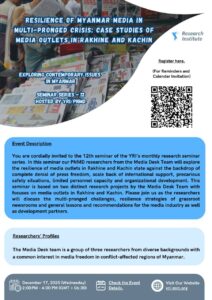Abstract
Myanmar is a multicultural nation where religion has shaped its history, identity, and education. While Theravada Buddhism is the dominant faith, minority groups practice Christianity, Islam, Hinduism, and Animism. Religious influences are evident in various educational systems, including monastic schools, ethnic schools, and Islamic institutions. Buddhism holds a “special position” in education, affecting the learning environment and the recognition of diverse religious identities. Given the strong presence of religion in education and society, it is crucial to understand its role in shaping inclusivity. This study examines religious practices in Myanmar’s educational institutions, focusing on university students’ perceptions in Mandalay and Kachin State. The research applied qualitative Discussions and online surveys to explore how religious practices create opportunities and challenges in fostering inclusive learning spaces. Findings suggest that religious practices can promote moral values but may also lead to exclusion. To address this, the study recommends mandatory civic education in schools to encourage respect and empathy, enhanced teacher training for inclusivity, and open discussions among stakeholders to promote religious understanding. These measures aim to create a more inclusive and diverse educational environment in Myanmar.

